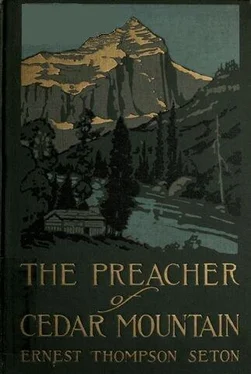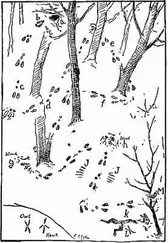Ernest Seton - The Preacher of Cedar Mountain
Здесь есть возможность читать онлайн «Ernest Seton - The Preacher of Cedar Mountain» весь текст электронной книги совершенно бесплатно (целиком полную версию без сокращений). В некоторых случаях можно слушать аудио, скачать через торрент в формате fb2 и присутствует краткое содержание. Год выпуска: 2009, Жанр: Прочие приключения, на английском языке. Описание произведения, (предисловие) а так же отзывы посетителей доступны на портале библиотеки ЛибКат.
- Название:The Preacher of Cedar Mountain
- Автор:
- Жанр:
- Год:2009
- ISBN:нет данных
- Рейтинг книги:3 / 5. Голосов: 1
-
Избранное:Добавить в избранное
- Отзывы:
-
Ваша оценка:
- 60
- 1
- 2
- 3
- 4
- 5
The Preacher of Cedar Mountain: краткое содержание, описание и аннотация
Предлагаем к чтению аннотацию, описание, краткое содержание или предисловие (зависит от того, что написал сам автор книги «The Preacher of Cedar Mountain»). Если вы не нашли необходимую информацию о книге — напишите в комментариях, мы постараемся отыскать её.
The Preacher of Cedar Mountain — читать онлайн бесплатно полную книгу (весь текст) целиком
Ниже представлен текст книги, разбитый по страницам. Система сохранения места последней прочитанной страницы, позволяет с удобством читать онлайн бесплатно книгу «The Preacher of Cedar Mountain», без необходимости каждый раз заново искать на чём Вы остановились. Поставьте закладку, и сможете в любой момент перейти на страницу, на которой закончили чтение.
Интервал:
Закладка:
The Chief came to the Fort to find out if the Colonel would sell Blazing Star after the race.
"We give twenty horses," and he held up both hands twice.
"No."
"Three hands ponies," and they held up both hands spread three times.
"No, he is not for sale."
Late that day Red Cloud and Howling Bull came to Colonel Waller and, after preliminaries, conveyed the information and warning: "All Crows heap big thief. You watch him; he steal horse every time, heap no good."
The third of July came, and the plain looked like a city of tents. Many traders were there to open temporary stores; and it is doubtful if any single race in the Western world has attracted more people or created intenser interest. The Cheyennes gave a great dance in honour of the Sun. They invited all the Sioux to come, and the whites invited themselves. Belle and Jim were there and saw much to please and much to disgust them. The general impression was one of barbaric splendour, weird chanting, noisy tom-toms, and hypnotic pulsation. It was mostly repellent, but sometimes the rhythm stirred them, and provoked a response which showed that the wild musicians were playing on instincts and impulses that are as wide as humanity.
Most horsemen like to keep their training ground in some sort private; but the garrison had given up all attempts at that, so far as Blazing Star and Red Rover were concerned. Every one knew, every one was interested, and each day there was an eager crowd waiting to feast their eyes on the two splendid racers. And they were well worth it. Even Jim had to acknowledge that Blazing Star was looking better now than ever before.
"Look at that neck, Belle, see how it arches, see the clean limbs; isn't he trained to perfection? If I only—if——" then he stopped himself.
As he fondly watched the horse with glowing eyes, he said: "Of course, we don't know anything at all about where or how he was bred, but I should say that that is a blood Kentucky, nearly pure—Kentucky gold dust."
Among the spectators were the two Indian Chiefs in their warpaint—Red Cloud of the Sioux, and Howling Bull of the Cheyennes. They spoke little to each other, for neither knew the other's tongue; but they made little gestures of the sign language, and any keen observer knowing it could catch the ideo-signs: "Good, good; by and by; we see good race; brave, swift," and so on. Later: "Yes, after one sleep. Rain heap, yes."
Jim watched them closely. "See that, Belle? he says: 'To-morrow it rain heap,' I wonder how he knows. They call the Fourth of July the Big Wet Sunday, because it usually rains then. I wonder how it will affect the race."
"Jim, you said they had shod the buckskin cayuse in expectation of a wet track."
"Yes; that's a mystery; how can they tell? The air is full of rumours, anyway. Chamreau says that Red Cloud has been seeking everywhere for fast horses. He had a man go as far as Omaha and another to Denver. Some say he did pick up a racer, a half-blooded Kentucky—some that he had got a wonderful pinto cayuse from Cheyenne; this latter is the more persistent rumour, though Chamreau says he can't find any one who has actually seen one or the other. Anyhow, no one knows what their entry will be. We have a pretty good idea of ours"; and Hartigan smiled proudly.
The two chiefs, with their followers, conversed earnestly, and with much gesture. They looked and pointed at the Crow camp and the rain sign came in many times, and emphatically. The old feud between the Sioux and the Crows had broken out afresh in a trader's store. Two young men from the opposing camps had quarrelled. They had drawn their knives, and each had been wounded. These things were common talk, and Belle and Jim watched the two chiefs ride toward the Crow camp with an eager curiosity to know more about it. When the Red men were a mile away and within half a mile of the Crow village, they followed at a good pace and reached the tepees in the secluded corner in time to see the two visiting chiefs making an address mainly by signs, as they sat on their horses. Chamreau was there, and in answer to Jim's question translated Red Cloud's address to the Crows thus:
"You make bad medicine so we lose race, we kill you." Then, indicating Howling Bull, "He say, 'you make bad medicine, bring rain, I kill you.'"
Having delivered their ultimatum, the visiting chiefs turned haughtily and rode to their own camp.
"I don't know just what they really did say," said Hartigan, "but if I'm any judge of looks, there'll be trouble here if those Crows don't get out."
It was four o'clock in the morning of the Fourth of July when the thunderbolt struck Fort Ryan. It was not very loud; it damaged no building; but it struck the very souls of men. A thousand thunder claps, a year's tornadoes in an hour, could not have been more staggering; and yet it was only four words of one poor, wheezing Irish hostler at the Colonel's window:
"Colonel! Colonel! For the love of God—come—come—come at once— Blazing Star is gone! "
" What? " and the Colonel sprang up.
The reveille had sounded, the men were just rising; but one group there was already about the stable talking with an air of intense excitement. The Colonel went without waiting to dress—the officer of the day with him. In terrible silence they hurried to the stable; there was Rover in his box, whinnying softly for his morning oats; but the next—the box of Blazing Star—was empty; and the far end, the outer wall, showed a great new doorway cut. Beyond, out in the growing light, troopers rode to every near-by lookout; but never a sign of horse did they see, or, indeed, expect to see. The case was very clear; the horse was stolen, gone clean away—their hope for the race was gone.
These were terrible moments for the hapless grooms and guards. Human nature, in dire defeat, always demands a victim; and the grooms were glad to be locked up in the guard house, where at least they were out of the storm of the Colonel's wrath. As the light grew brighter a careful study laid bare the plan of robbery. The stables formed, in part, the outer wall of the quadrangle. They were roofed with pine boards, covered with tar-paper on cedar corner posts; the walls, however, were of sods piled squarely on each other in a well-known Western style, making a good warm stable. It was a simple matter to take down quickly and silently this outer wall from the outside, beginning at the top, and so make another exit. This had been done in the dead of night. And the track of the racer told the tale like a printed page.
A general alarm had gone forth; all the Fort was astir; and the army scouts were by the case forced into unusual prominence. It was Al Rennie spoke first:
"Colonel, it's a-going to rain, sure; it's liable to rain heavy. I suggest we take that trail right away and follow before it's all washed out."
"The quicker the better," said the Colonel.
Riding ahead on the trail like a hound went the old trapper-hunter-scout with a band of troopers following. They had not gone a quarter of a mile before the rain began to spit. But the line of the trail was clear and it was easy for the practised eye to follow. It headed east for half a mile, then, on a hard open stretch of gravel, it turned and went direct for the Crow camp. Rennie could follow at a gallop; they rounded the butte, cleared the cottonwoods, crossed the little willow-edged stream, and reached the Crow camp to find it absolutely deserted!
The rain was now falling faster; in a few minutes it set in—a true Dakota flood. The trail of Blazing Star—clear till then—was now wholly wiped out. There was nothing but the unmarked prairie around them; and the guide, with the troopers, soaked to the skin, rode back with the forlorn tidings.
CHAPTER XLI
Интервал:
Закладка:
Похожие книги на «The Preacher of Cedar Mountain»
Представляем Вашему вниманию похожие книги на «The Preacher of Cedar Mountain» списком для выбора. Мы отобрали схожую по названию и смыслу литературу в надежде предоставить читателям больше вариантов отыскать новые, интересные, ещё непрочитанные произведения.
Обсуждение, отзывы о книге «The Preacher of Cedar Mountain» и просто собственные мнения читателей. Оставьте ваши комментарии, напишите, что Вы думаете о произведении, его смысле или главных героях. Укажите что конкретно понравилось, а что нет, и почему Вы так считаете.




